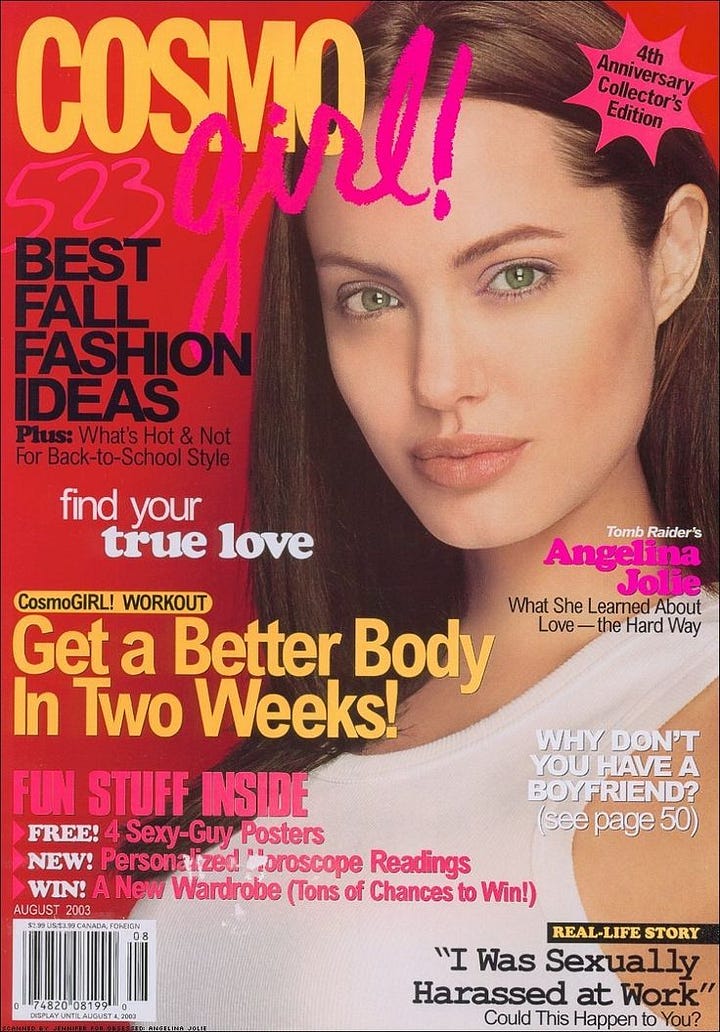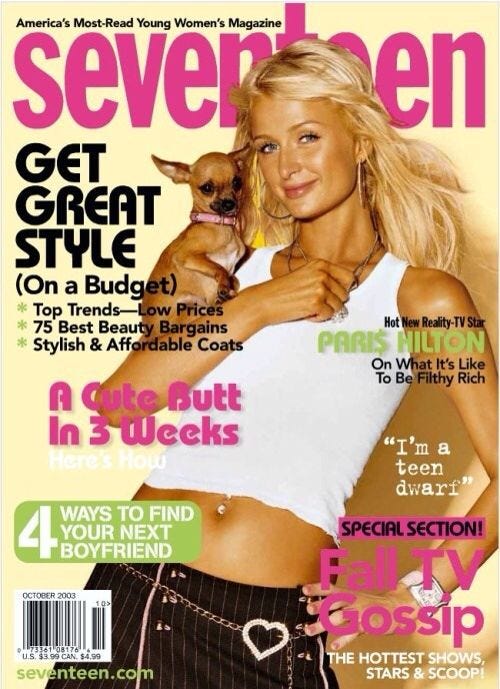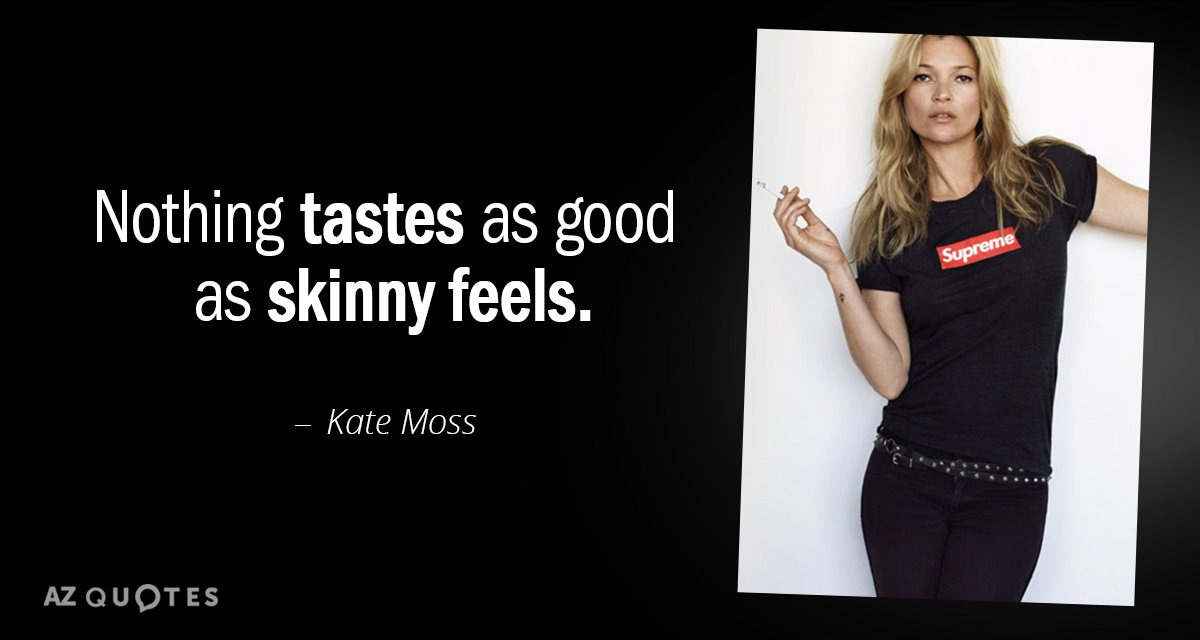I can't stop thinking about SkinnyTok
TW: This post explores SkinnyTok, discusses body dysmorphia, disordered eating, and more. If that's not your vibe, probably don't read this one!
I feel very lucky in so many ways. I have a roof over my head. I don’t have to worry about ICE agents abducting me as I commute to work. Both my parents are alive and healthy and loving life. But, something I feel extra luck for is my fairly uncomplicated relationship with my body. And after listening to “Liv Schmidt & the Sexless Allure of SkinnyTok” on the masterful Diabolical Lies podcast, that luck shines even more.
I just started going to a new therapist. My old therapist, M, is taking a break from the field and thus, broke up with me. I cried in our last session thinking about how far we’ve come since the anxious girl who showed up in her drab but simultaneously cozy Midtown office two years ago. Luckily (again, my life is full of luck), the practice M worked for has an abundance of cool therapists ready to take me on. I was transferred to F who was informed about me by M.
This may make some people uncomfortable, two therapists talking about you behind your back. But I loved it. I wish I could have listened in on their conversation. Like, did M mention how many different hair colors I’ve had in the last 2 years? That my cats like to interrupt our, now virtual, sessions? I’ll never get that answer unfortunately. Instead, I know that M shared all the things I’ve worked on and things I still need to tackle.
F worked through the list, ending on, “And M mentioned ‘slight body issues,’ so we can discuss that too.” I nodded, saying: “Yeah, nothing too serious, just, like, being a woman in modern society.” F laughed, “It affects us all.”
But really, I am lucky that I don’t think about my body every second of every day. Or what I eat, or how I look. Sure, I have a touch of body dysmorphia. I sometimes don’t know what I look like, often don’t know my clothing size, and am perplexed by my eyebrow that sits higher than the other. But overall, my brain is quiet on the body front.
Two years ago, I wrote an essay titled, To the weight I’ve gained this summer. That summer, I was on the brink of my new life and was experiencing a heightened amount of anxiety. Thus, I was constantly thinking my body was breaking down. Reading it back, I smile. It’s a kind essay full of kind words to myself. And it sums up my relationship to my body. Relatively neutral. For that, I feel — you guessed it — LUCKY.
SkinnyTok and its far reaching claws
I grew up in the early 2000s when magazines were king. I routinely got my hands on Cosmopolitan where I was told to journal my food. I was 12. Seventeen Magazine showed ultra skinny girls holding backpacks. I stared down at my gloriously normal body and thought, "Hmmm…I don’t look like them.”


But, magazines were not constantly in front of my face. I still had a childhood. And I looked like a little girl. My body was plump, my teeth were crooked, and my hair was frizzy. At that time, I never liked photos of myself, but looking back, I was adorable! Unaware of the world and its horrid opinions concerning women.
The girls of today live much different lives. They have their phones and thus, access to TikTok. Now, I love TikTok. I spend a lot of time on that dumb app, giggling, learning how to properly put on a duvet cover, watching Love Island USA edits. Even at 29, my brain hurts after scrolling. It’s hard for me to look away when the algorithm is so strong and alluring.
Which is why SkinnyTok is so powerful. I’m not technically on SkinnyTok, but I see its influences. Creators are skinnier than ever before. “What I eat in a day” videos are more popular. And every woman I know is trying to eat more protein to get more “toned.” The vibes of the internet are much different than during the body positivity movement of 2019 or even during my childhood.
Liv Schmidt is at the core of SkinnyTok. The 23-year-old became TikTok famous after losing 20 pounds. Her Instagram bio reads, “It’s not a sin to want to be thin,” which sounds just like Kate Moss’s 2009 statement, “Nothing tastes as good as skinny feels.” History repeats itself. While the messenger of skinny was once a supermodel, it’s now a former finance intern turned TikTok influencer.
Followers love Liv because she is blunt (and skinny, white, and blonde). During a “what I eat in a day” video, Liv said, “Half the time you’re not actually hungry, you’re just literally just thirsty.” After amassing 670,000 followers on the app, TikTok banned her in September 2024, claiming she shared “disordered eating” content.
In a now archived interview with Evie Magazine, Liv explained, “To me, skinny isn’t a number. It’s clarity. It’s control. It’s walking out of dinner feeling light. It’s not needing a nap because your blood sugar crashed. It’s not overeating and calling it healing. It’s peace.”
While she was kicked off TikTok, Liv continued to make content and subsequently was rewarded for that same ED-glorification content on Instagram. She created a subscription channel on the app called the Skinni Société. For $20 a month, members gained access to exclusive content on Liv’s Instagram page, like recipes, workout videos, and diaries of everything she eats in a day. E.J. Dickson, a reporter from The Cutjoined the Skinni Société to investigate deeper and what she found was…frightening.

“Inside the group, members post ridiculously high step counts and commiserate over the side effects of their low-calorie diets, like hair loss and dizziness,” E.J. wrote. “Though the group is technically closed to those under 18, when I joined I found more than a dozen members who are high-school students, one of whom is a freshman.”
The Skinni Société was a glorified eating disorder group, praising calorie restriction. After The Cut’s piece, Liv was demonetized on Instagram too. And like many wellness influencers, she is using the alt-right playbook to discuss her demonetization.
“[TikTok] couldn’t control me, so they tried to silence me,” Liv told Evie. This sentiment is sooooo alt-right I just have to laugh! TikTok couldn’t control her [from sharing disordered eating content], so they tried to silence her [for sharing disordered eating content].
When I became more aware of SkinnyTok, I started thinking more about my body. About women’s bodies. About how often we as women have to think about our bodies.
and at Diabolical Lies dive into this obsession, describing that — big surprise — it’s the patriarchy’s fault!Women with higher BMIs make less money, but men with higher BMIs don’t experience the same pay discrepancies. And then, there’s the BMI of it all. For the uninitiated, BMI means body mass index, or “the body mass divided by the square of the body height.”
Kaite and Caro found that in 1998, the NIH shifted the normal BMI from 27 to 25. As they said, a woman could have gone to bed with “normal weight” and woke up the next day “obese.” BMI has been discounted in recent years.
In 2023, Kathy Katella at Yale Medicine wrote, “One issue is that BMI was developed based on the bodies of non-Hispanic white men; it may not provide consistently accurate results for people who fall into other categories of sex, ethnicity, and race. [Another] is that a person with lots of muscle and minimal body fat can have the same BMI as a person with obesity who has much less muscle.”

More and more women want to decrease their BMIs, even if it is a useless statistic. Just moments ago, I received an email from Emily Sundberg with the headline: “1 in 3 Feed Me readers surveyed use a GLP-1.” Being skinny is everywhere, even if Liv Schmidt is banned from TikTok.
While I’m lucky to not constantly obsess over my body, I still have the longing desire to be skinny. It doesn’t impact my every day or every thought, but it’s there, just like it’s there for most women.
Caro of Diabolical Lies, explained that she expected this longing for skinny to be released once she found a husband. But now that she’s married, she’s horrified to find it persists.
SkinnyTok is just as pervasive as the inherent desire for women to be skinny. As Katie and Caro wrote in their accompanying piece to their Liv Schmidt episode, “The most interesting thing about the resurgence of thinness is the fact that the rewards for achieving it have been there all along—and now that our bodies are becoming AI-ified, the result is blindingly sterile and sexless: As RS Benedict put it, “Everyone is beautiful and no one is horny.””
Perhaps it boils down to whether you are scrolling social media or checking the pantry, you’ve got to be mindful of what you consume. Empty calories from processed food and empty promises from vapid and vain influencers can both be harmful. Use Tiktok for entertainment, not as a compass to guide your major lifestyle decisions. Much like a Hostess Twinkie, social media influencers are ultra-processed commodities that are bought and paid for, often living boring, ultra restricted lives.









